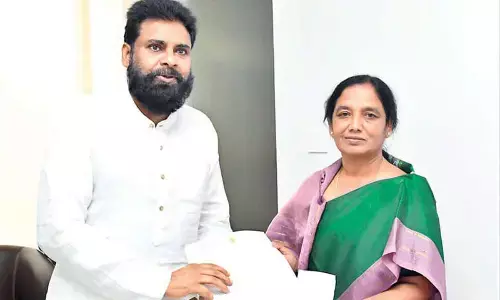Education and career: What you study is not what you are

In India, the concepts of higher education and career planning are often conflated Parents think of higher education choices as determinants of a childs career, expecting a clear and direct connection between what their child will study and what his or her career will be
In India, the concepts of "higher education" and "career planning" are often conflated. Parents think of higher education choices as determinants of a child's career, expecting a clear and direct connection between what their child will study and what his or her career will be.
This logic has worked for those pursuing careers in medicine and law; after all, who wants to engage a lawyer who didn't go to law school or a doctor who doesn't have a medical degree? Today, however, most higher education choices rarely result in a career directly related to a major. For example, not all Indian Institute of Technology (IIT) graduates work as engineers and not all economics students become economists. And even if you attended law school, there is no "rule" that you must work as a lawyer. The main point of education is to develop critical thinking skills that can be used in any career.
Moreover, it is important to understand that the employment landscape is changing swiftly. As conventional business models are upended, new jobs are emerging, and the pace of change is exponentially fast. Jobs are fluid, requiring multiple skills; a singular focus is no longer adequate for a career that spans 40-plus years. Since no one can say with certainty what the jobs of the future will look like, developing foundational skills is key to remaining employable. This means that, practically speaking, studying any subject in university can serve as a platform to access a range of careers.
When engaging a career counselor, be sure to understand that, while higher education and career choices can go hand in hand, the ground reality can be quite different. Here are some things to consider. Sidestep Grade 8 panic: As educators, we meet parents of Grade 8 students who worry that their child "has no direction" or "doesn't know what he/she wants to do". Don't panic, it is perfectly normal for a 13-year-old to be unsure. They have barely been exposed to subjects such as physics, economics or calculus nor have they critically examined Shakespeare or UN policy toward refugees.
The point is, up until Grade 8, they have acquired the building blocks to learn more, at a faster pace and across disciplines. It seems premature and slightly unfair to ask them what they want to do when they are just beginning to build knowledge and hone skills. At Grade 8, students lack the capacity to make career-related decisions, so parents need to guide them in making informed decisions, keeping as many options open as possible. Make informed choices: The Indian education system forces students to make irreversible choices early. Understanding this is key when deciding a "stream" and choosing subjects after Grade 10. Eliminating certain subjects, especially science and math, just because they may not seem related to a potential future career, is shortsighted.
Let's say a student wants to be a journalist, so they drop math and/or science in high school, reasoning that these subjects are irrelevant. In doing so, they are neglecting to prepare themselves for a world in which disciplines intersect. For example, as a features journalist, they may want to profile a start-up that uses Artificial Intelligence (AI) to offer time-sensitive medical solutions. In this case, a writer with a working knowledge of science and math can craft an insightful piece on how this type of game-changing technology can transform healthcare delivery. Taking math and science in high school would help this journalist draw parallels and see intersections between seemingly unrelated concepts.
Ensuring children have a broad-based education across subjects that are "core" -- mathematics, languages, science and history -- puts them in good stead to pursue whatever they want in university and beyond. Psychometric tests do not have all the answers: In India, we tend to test for everything. From board examinations, to music, dance and art, the ultimate recognition is through an examination that validates competence. While this seems logical, it can dilute a child's true passion for an activity or subject. Sometimes a young person might just want to play the piano, learn hip hop or paint on a canvas without seeking anyone's approval. This idea may be alien, especially to parents who carry folders of certificates to prove how accomplished their child is.
This same logic applies to psychometric tests. While these tests can offer an indication of key strengths, they cannot decide someone's "career." Only the individual can do that. We recently spoke to a frazzled mother who said, "This psychometric test says my son should take commerce, but he wants to take science. What do I do?" I find asking students probing questions about what they enjoy, motivating them to try harder (if needed) and encouraging them with digestible action items to be more effective than an algorithm that spits out an optimal "career". Who says one career/job only?: Justin Tobin, founder of innovation consultancy DDG, recently told The Guardian that, "...more and more independent thinkers are realising that being an employee for just one company is the equivalent to putting all your money into one stock -- a better strategy is to diversify your portfolio. So, you're seeing a lot more people looking to diversify their careers."
We see this in practice every day. We know a professional colleague who also owns a thriving salon business and another who has invested in a bakery, supporting his friends' passions while creating a diversified income stream. Service-focused industries such as advertising and management consulting draw upon the experiences of creative individuals such as novelists, anthropologists, photographers, designers and technologists, in addition to data-and-information-focused engineers, accountants and lawyers. The diverse successes and failures of these individuals inform their effectiveness when collaborating with others to develop innovative solutions. When an individual has the opportunity to indulge a range of interests, their creativity and satisfaction soar. And that's when their best work and efforts materialise.
BY Kavita Mehta and Namita Mehta









